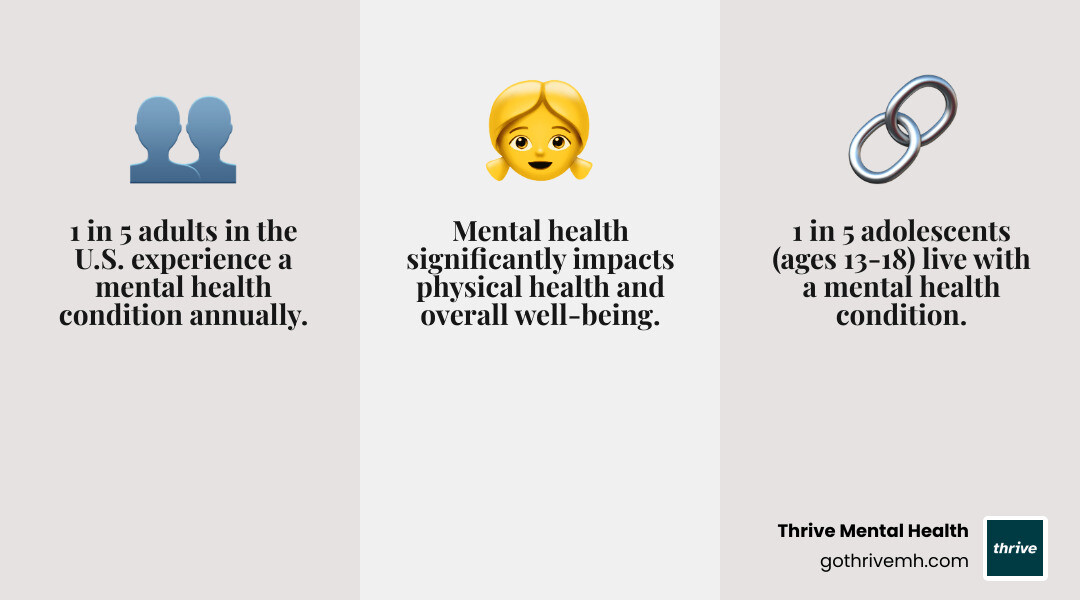Behavioral Health Boosters: Where to Find the Best Mental Health Support

[988 Lifeline] If you are in crisis or having thoughts of suicide, call or text 988 now. Free, confidential, 24/7.
[Callout Box] If you’re in crisis, call/text 988 right now. You are not alone.
Mental Health Help in 24 Hours: Costs, Insurance, and Care Options [2025]
Mental health affects how we think, feel, and act. It determines how we handle stress, relate to others, and make choices.
Quick Mental Health Facts:
- 1 in 5 adults experience a mental health condition each year.
- Mental health includes emotional, psychological, and social well-being.
- Recovery is possible with the right support and treatment.
- Early intervention leads to better outcomes.
Finding quality mental health support shouldn’t be impossible. Whether you’re dealing with anxiety, depression, or just need someone to talk to, the right resources make all the difference. This includes understanding options like Medication Management and finding affirming care, such as support for the LGBTQIA+ community.
Your mental health is just as important as your physical health. When your mind is struggling, your relationships, career, and quality of life can suffer. The good news is that today’s mental health landscape offers more options than ever, from virtual therapy to intensive programs that fit your life.
I’m Anna Green, LMHC, LPC, founder of Thrive. With years of experience as a Chief Clinical Officer using evidence-based treatments, I’ve seen how the right mental health support transforms lives.

What is Mental Health and Why is it Crucial for Your Overall Well-being?
Mental health is the foundation that supports every aspect of your life. It’s your emotional well-being (managing feelings), psychological well-being (thinking clearly and having a sense of purpose), and social well-being (building healthy relationships).
When these areas are strong, you’re better equipped to cope with stress, realize your abilities, work productively, and contribute to your community. It’s what allows you to not just survive, but thrive.
Mental health exists on a spectrum. You might be managing a mental health condition while still experiencing overall well-being, or you could be struggling without a formal diagnosis. There’s no shame in either situation, and there’s always hope for improvement.
Your mind and body are deeply connected. Taking care of your mental health is essential for your physical health, and vice versa. Scientific research on the link between chronic illness and mental health shows just how intertwined these aspects of our health are.

Common Mental Health Conditions
Understanding common mental health conditions helps remove stigma. These are treatable medical conditions.
- Depression: A persistent heaviness that affects sleep, appetite, energy, and self-worth, making simple tasks feel overwhelming.
- Anxiety Disorders: Include generalized anxiety, panic disorder, and social anxiety. They involve intense fear and worry that go beyond everyday nervousness.
- Bipolar Disorder: Involves significant mood swings, with periods of mania (liftd mood and energy) alternating with episodes of depression.
- Schizophrenia: Affects how someone interprets reality, but with proper treatment, many people lead fulfilling lives.
- Serious Mental Illness (SMI): A term for conditions like major depression, bipolar disorder, and PTSD that significantly impact daily functioning.
If any of these resonate with you, know that effective treatments exist. You can find more info on mental health conditions from MedlinePlus.
Mental Health Across the Lifespan
Your mental health needs change as you grow. Understanding these developmental changes helps normalize the challenges.
- Childhood: Challenges often center on managing big emotions, anxiety, and ADHD.
- Adolescence: Pressures from social media, academics, and identity formation are intense. 1 in 5 adolescents experience a mental health condition.
- Adulthood: Stressors include career demands, relationship complexities, and financial pressures.
- Older Adulthood: Concerns often involve life changes like retirement, health issues, and social isolation.
The Inseparable Link Between Physical and Mental Health
Your mind and body are constantly influencing each other. Depression impacts chronic conditions like diabetes, heart disease, or recovery from stroke by making physical symptoms worse and reducing motivation for self-care. Conversely, chronic conditions increase mental health risks due to ongoing pain, stress, and lifestyle limitations. Addressing both physical and mental health together leads to the best outcomes.
Key Factors That Shape Our Mental Well-being
Your mental well-being is shaped by a rich ecosystem of influences. Think of these as a series of connected circles.

- Individual factors: Your genetics, personality, coping skills, and physical health.
- Family dynamics: Your upbringing, communication patterns, and generational history.
- Community support: Your friends, workplace culture, and local resources.
- Societal influences: Economic stability, healthcare access, and cultural attitudes toward mental health.
Risk Factors vs. Protective Factors
We all have both vulnerabilities and strengths when it comes to mental health. The key is knowing which is which.
Risk factors make us more vulnerable to mental health struggles. These include:
- Trauma, especially from childhood
- Isolation and lack of social support
- Substance use
- Economic insecurity and chronic stress
Protective factors build resilience and act as emotional shock absorbers. These include:
- Strong social connections
- Healthy coping skills
- Financial stability
- Access to care
Many protective factors can be developed and strengthened over time. You can learn about risk factors for emotional distress from SAMHSA to better understand what might be affecting you.
The Critical Role of Early Intervention
Just like with physical health, ignoring a small mental health problem can make it worse. Early intervention is life-changing because smaller problems are easier to solve.
Why early help matters: When someone gets help for depression in its early stages, treatment works faster and more effectively. It prevents a domino effect that can disrupt work, relationships, and overall quality of life.
Improving outcomes: Research shows that people who get timely help often need less intensive treatment and maintain their progress longer. The CDC champions this public health approach, recognizing that prevention and early care benefit everyone.
Programs like Intensive Outpatient Programs (IOP) offer a middle ground, providing more support than weekly therapy while allowing you to maintain your daily routine. Getting help early is one of the smartest investments you can make in your future self.
Your Guide to Finding the Right Mental Health Support
When you’re struggling, finding help can feel overwhelming. The good news is there are more support options available today than ever before, and finding the right fit is possible.
Mental health support exists on a spectrum, from self-help tools to traditional therapy to more intensive programs. The most important thing is taking the first step.

Immediate Help: Crisis and Emergency Resources
[Callout Box] If you are in crisis or having thoughts of suicide, call or text 988 now. The 988 Suicide & Crisis Lifeline is free, confidential, and available 24/7. You are not alone.
Some moments can’t wait. If you’re in immediate distress, help is available right now.
- The 988 Suicide & Crisis Lifeline is your fastest connection to trained counselors. Dial or text 988 anytime. Learn more at 988lifeline.org.
- The Veterans Crisis Line offers specialized support. Call 988 and press 1.
- The Disaster Distress Helpline provides crisis counseling for distress related to disasters. Call 1-800-985-5990.
Reaching out during a crisis is a sign of strength.
Professional Support and Treatment Options
Several levels of professional care are designed to meet different needs.
- Outpatient Therapy: Typically involves meeting with a therapist weekly, either in-person or virtually.
- Intensive Outpatient Programs (IOP): Offer a middle ground with several hours of therapy per week while you live at home. Our Intensive Outpatient Program (IOP) at Thrive Mental Health is flexible and fits around your schedule.
- Partial Hospitalization Programs (PHP): Provide more intensive, full-day support without an overnight stay. Learn about our Partial Hospitalization Program (PHP).
- Inpatient Care: Reserved for situations requiring 24/7 medical and psychiatric supervision for safety.
Find treatment options with FindTreatment.gov or take a free mental health screening to better understand what support might be right for you.
Paying for Care: Navigating Insurance in Florida
Navigating insurance for mental health care can feel complex, but it’s manageable. You’ll need to know your plan’s deductible, co-pays, and the difference between in-network (lower cost) and out-of-network providers.
Verifying coverage is the most important step before starting treatment. At Thrive Mental Health, we work with major insurance providers including Cigna, Optum, and Florida Blue. Whether you’re in Florida cities like Miami, Orlando, Tampa, or Jacksonville, our virtual and hybrid programs are designed to work with your insurance.
We can help you understand your benefits. You can verify your insurance with us in minutes with no obligation, so you can focus on getting better, not on costs. Start your benefits check here → Verify Insurance.
How We Can All Foster a Mentally Healthy Society
Creating a world where everyone can thrive mentally is a collective responsibility. It’s about building communities that prevent problems from starting in the first place by reducing stigma and creating supportive environments where asking for help is normal.
At Thrive Mental Health, we see this ripple effect daily. When someone joins our virtual IOP program, they learn skills that benefit their family, workplace, and community. You don’t need a psychology degree to make a difference. Every conversation you have contributes to a more mentally healthy world. You can read our blog on creating a mentally healthy workplace for more strategies.
Fighting Stigma in Your Community
Stigma thrives in darkness and withers in light. The more we talk openly about mental health, the less power harmful beliefs have.
- Use person-first language: Say “a person living with depression,” not “a depressed person.” This separates the person from their condition.
- Share stories responsibly: When someone says, “I’ve been there too,” it breaks through isolation. Always respect privacy and boundaries.
- Educate others: Gently correct misinformation. For example, explain that depression involves brain chemistry that positive thinking alone can’t fix.
- Normalize help-seeking: Talk about therapy as a normal part of self-care, like going to the gym or a doctor.
Building Supportive Workplaces and Communities
Building supportive environments means treating mental health with the same seriousness as physical safety.
- Workplace wellness programs: Offering stress management workshops or easy access to resources benefits both employees and the company.
- Flexible policies: The ability to work from home or adjust schedules for therapy can be life-changing for someone managing a mental health condition.
- Leadership training: When managers know how to have compassionate conversations and direct people to resources, they become part of the solution.
- Community centers and peer support groups: These create essential spaces for connection and healing.
When we work together, we transform our environments into places where mental health is a fundamental part of how we care for each other.
Frequently Asked Questions about Mental Health
Here are concise answers to common questions people ask.
What are the first signs I might need mental health help?
- Big changes in sleep/appetite, persistent low mood or anxiety, withdrawing from others, trouble functioning at work/school, or unusual thoughts/paranoia. If you notice these for 2+ weeks, consider reaching out.
How can I get help fast if it’s not an emergency?
- Start with Virtual Therapy or our Intensive Outpatient Program (IOP) for structured support without pausing life. If you’re in immediate danger, call/text 988.
Does insurance (Cigna, Optum, Florida Blue) cover IOP/PHP in Florida?
- Often yes. Coverage varies by plan, but we’re in-network with major carriers. Quickest path: Verify Insurance to confirm benefits for IOP/PHP in your city.
How much does virtual therapy or IOP cost with insurance?
- Costs depend on co-pays, deductibles, and coinsurance. Many pay a standard therapy co-pay for virtual sessions; IOP costs vary by plan. Get an exact estimate in 2 minutes → Verify Insurance.
How long does recovery take?
- It varies. Many feel better within weeks with therapy/IOP; others need months. Early support improves outcomes. Recovery means building a life you value—even if some symptoms remain.
Suggested FAQ schema (JSON-LD):
{
“@context”: “https://schema.org”,
“@type”: “FAQPage”,
“mainEntity”: [
{
“@type”: “Question”,
“name”: “What are the first signs I might need mental health help?”,
“acceptedAnswer”: {“@type”: “Answer”, “text”: “Changes in sleep/appetite, persistent low mood or anxiety, social withdrawal, decline in functioning, or unusual thoughts. If symptoms last 2+ weeks, consider professional help.”}
},
{
“@type”: “Question”,
“name”: “How can I get help fast if it’s not an emergency?”,
“acceptedAnswer”: {“@type”: “Answer”, “text”: “Start with virtual therapy or an Intensive Outpatient Program (IOP). For immediate danger, call or text 988.”}
},
{
“@type”: “Question”,
“name”: “Does insurance (Cigna, Optum, Florida Blue) cover IOP/PHP in Florida?”,
“acceptedAnswer”: {“@type”: “Answer”, “text”: “Often yes. Coverage varies by plan and location. Verify benefits online in minutes to confirm in-network coverage.”}
},
{
“@type”: “Question”,
“name”: “How much does virtual therapy or IOP cost with insurance?”,
“acceptedAnswer”: {“@type”: “Answer”, “text”: “Costs depend on co-pays, deductibles, and coinsurance. Many pay a standard therapy co-pay for virtual sessions; IOP costs vary by plan.”}
},
{
“@type”: “Question”,
“name”: “How long does recovery take?”,
“acceptedAnswer”: {“@type”: “Answer”, “text”: “Timelines vary by person and condition. Many feel better within weeks; others need months. Early intervention improves outcomes.”}
}
]
}
Ready for Support?
Ready for support? Thrive offers virtual and hybrid IOP/PHP with evening options. Verify your insurance in 2 minutes (no obligation) → Start benefits check or call 561-203-6085. If you’re in crisis, call/text 988.